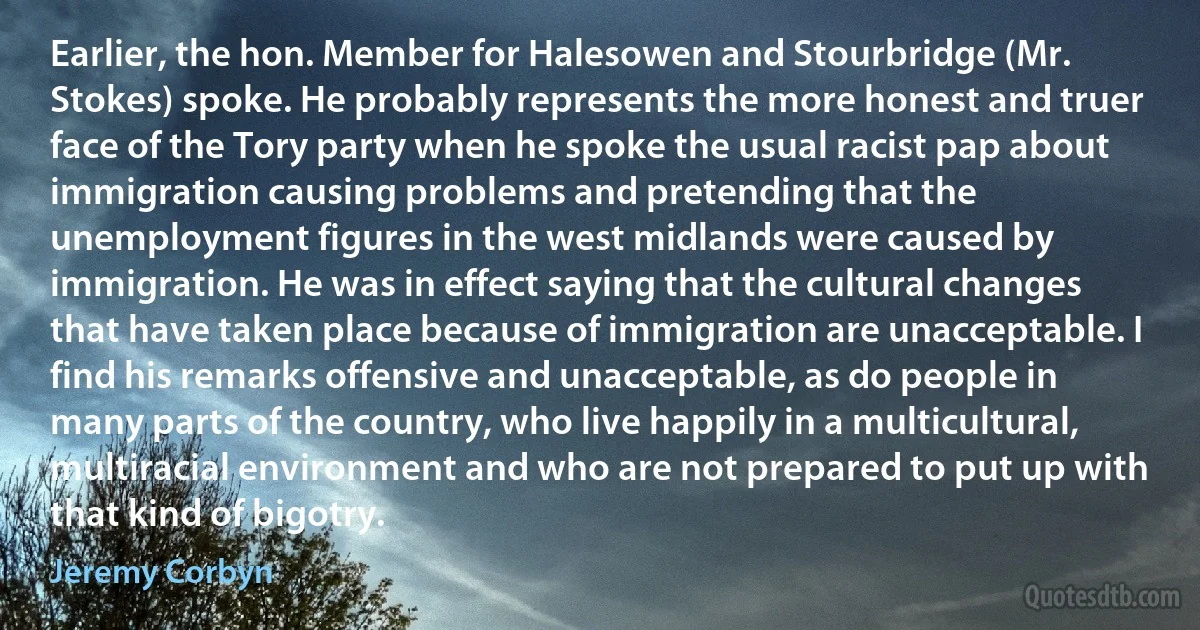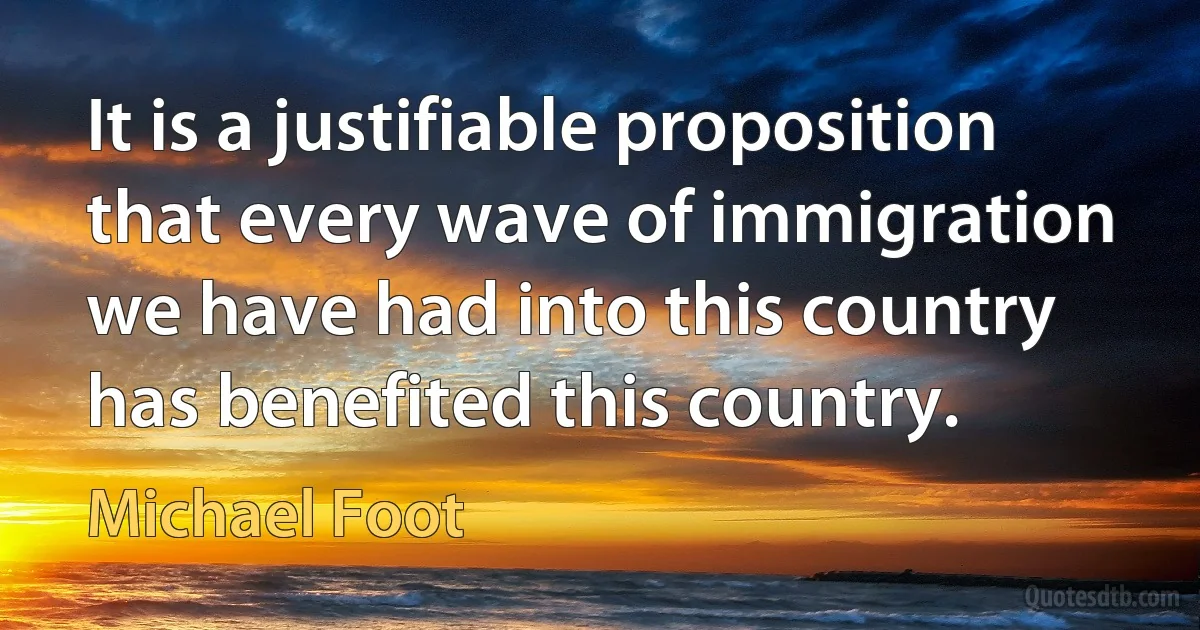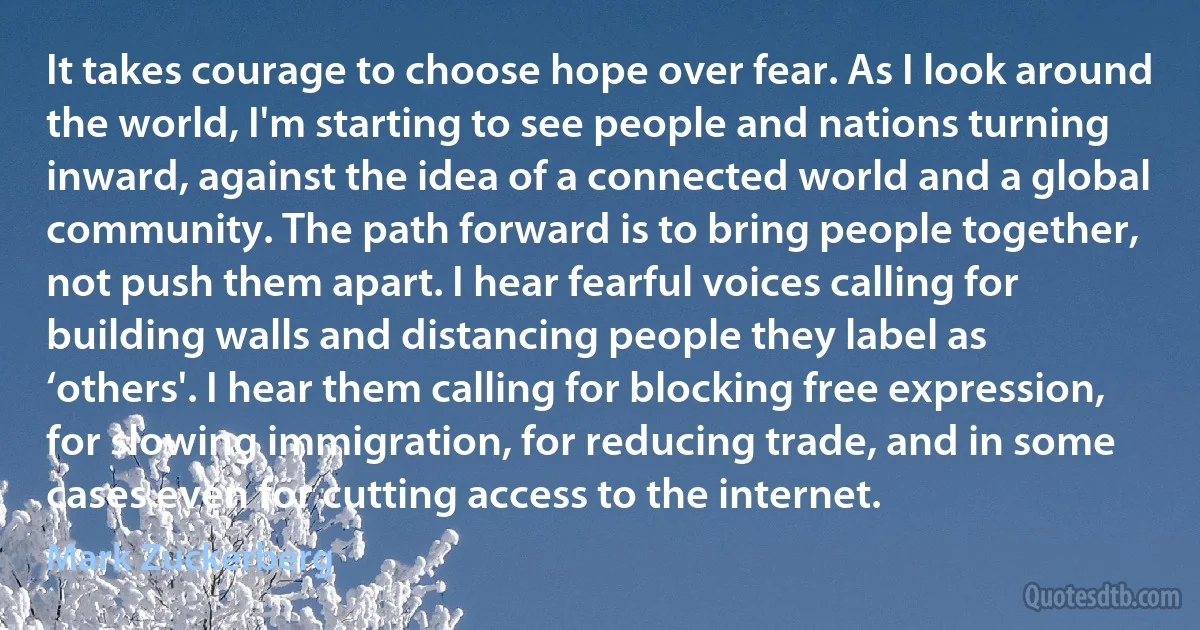Immigration Quotes - page 7
The most important thing is that we need to be a party that is inclusive and tolerant. We can be those things and be the party we always have been. We need to think about the environment. Teddy Roosevelt was a great environmentalist and people forget Reagan was the one who dealt with the ozone layer with the Montreal protocol. We also need to talk about healthcare honestly. Nixon almost passed universal healthcare. We need to have an talk about immigration and realize you can't just deport people. We need a comprehensive answer. We also need to stay out of people's bedrooms. The party that is for small government shouldn't be over-reaching into people's private lives. Mainly, we need to be a party where people know what we are for, not just what we are against.

Arnold Schwarzenegger
In secondary immigration, as I await processing, I sit with people for whom I imagine the experience is less of a novelty. To be blunt, non-white people. Mexican and Arabian people, mostly-I assume, I don't look at their passports; they don't have them, they're behind the desks with the border police, equally trapped and obese, behind the counter, often the same color as the people they're casually harassing. "Who does this notion of nation most suit,” I wonder as I sit there, unable to use my phone. Proper rich people don't encounter these rooms, these borders, these problems. For them the world is as it is when seen from space, without boundary, without limitation, full of fluid possibility and whispering wonder.

Russell Brand
I had also got used to the idea that here [in the UK] you can make quips all the time and in America that can be very dangerous. I wrote about it in one of the books. Once I was going through customs and immigration in Boston, and the guy said as I went past "Any fruit or vegetables?" and I said "OK, I'll have four pounds of potatoes if they are fresh" and it was like he was going to take me off and pin me to the floor.

Bill Bryson
I think what's going to hurt the Republicans enormously is the extremist position of Mitt Romney on the immigration issue and states like New Mexico, states like Colorado, Nevada, Arizona - and I think it's going to be the margin of victory for President Obama, a very narrow victory.

Bill Richardson
If one of the main reasons for passing the Gang of Eight immigration bill is so Republicans can prove that they don't hate Hispanics, then what's next? Are the Republicans going to have to support gay marriage to prove that they don't hate gays? Are the Republicans then going to have to support affirmative action to prove they don't hate blacks?

Rush Limbaugh
Most Christian 'believers' tend to echo the cultural prejudices and worldviews of the dominant group in their country, with only a minority revealing any real transformation of attitudes or consciousness. It has been true of slavery and racism, classism and consumerism and issues of immigration and health care for the poor.

Richard Rohr
They tell us we must be prepared to contemplate, in fact to welcome, the alteration and alienation of our towns and cities. They tell us there is no such thing as our own people and our country. Indeed there is, and I say it in no mean or arrogant or exclusive spirit. What I know is that we have an identity of our own, as we have a territory of our own, and that the instinct to preserve that identity, as to defend that territory, is one of the deepest and strongest implanted in mankind. I happen also to believe that the instinct is good and that its beneficent effects are not exhausted. ... In our time that identity has been threatened more than once. In the past it was threatened by violence and aggression from without. It is now threatened from within by the foreseeable consequences of a massive but unpremeditated and fortunately, in substantial measure, reversible immigration.

Enoch Powell
[I]t depends indeed on whether the immigrants are different, and different in important respects from the existing population. Clearly, if they are identical, then no change for the good or bad can be brought about by the immigration. But if they are different, and to the extent that they are different, then numbers clearly are of the essence and this is not wholly – or mainly, necessarily – a matter of colour. For example, if the immigrants were Germans or Russians, their colour would be approximately the same as ours, but the problems which would be created and the change which could be brought about by a large introduction of a bloc of Germans or Russians into five areas in this country would be as serious – and in some respects more serious – than could follow from an introduction of a similar number of West Indians or Pakistanis.

Enoch Powell
Thirty percent of Republicans believe the scourge of the Earth is Mexican immigration. What's the reason for why I don't have a job? Well, make, make Mexican immigration the scapegoat for that. I understand why there's that sentiment. And there's a logic to the fact that they're coming over. They're taking our jobs. They're taking, you know, they're siphoning off our welfare system. When the reality is anything but. They are not taking jobs that U.S. citizens want. They're the cream of the crop when it comes to workers. And they are contributing to the economy.

Gary Johnson
I learned a great deal about immigration as a child because my father came from Poland at the age of 17, without a nickel in his pocket, without knowing one word of English. He came to the United States to escape the crushing poverty that existed in his community, and to escape widespread anti-Semitism. And, it was a good thing that he came to this country because virtually his entire family was wiped out by Hitler and Nazi barbarism... The underlying principles of our government will not be racism, sexism, xenophobia, homophobia, and religious bigotry. I did not come from a family that taught me to build a corporate empire through housing discrimination. I protested housing discrimination, was arrested for protesting school segregation, and one of the proudest days of my life was attending the March on Washington for jobs and freedom led by Dr. Martin Luther King Jr.

Bernie Sanders
I think that what we need is to create policies which deal with immigration in a rational way. And a rational way is not locking children up in detention centers or separating them from their mothers. What we need is Trump to sit down with members of Congress and work on a rational program which deals with this serious issue.

Bernie Sanders
I am not a great fan of shouting down people or being rude to people, I think we have a situation and a Congress that's way out of touch with where the American people are. People have a right to be angry when Congress gives tax breaks to billionaires and wants to cut nutrition programs for low income pregnant women. You have a right to be angry. Take that out in a constructive way. ... I think people have a right to go into a restaurant and have dinner, that's where we got to place our energy. I do know that people are angry. They are angry about these terribly inhumane immigration policies. They're angry about the fact they can't afford prescription drugs. They are angry about tax breaks that go to billionaires. The way to deal with that is exactly what Alexandria did. Organize at the grass roots level. Win elections and get involved in the political process.

Bernie Sanders
These are points to consider when we put our house in order for the advancing hordes of aliens. Experience has taught us to have faith in the bulk of our people. The great decisions in American history have always been right. The heart of the nation is sound and must be kept sound. It is a characteristic of ours that we are ashamed not to be right. I believe that our present concern about immigration is a fear that we will not be able to protect ourselves and at the same time discharge our obligations.

Calvin Coolidge
The fame of the advantages which accrue to the inhabitants of our country has spread throughout the world. If we doubt the high estimation in which these opportunities are held by other peoples, it is only necessary to remember that they sought them in such numbers as to require our own protection by restrictive immigration. I am aware that our country and its institutions are often the subject of censure. I grieve to see them misrepresented for selfish and destructive aims. But I welcome candid criticism, which is moved by a purpose to promote the public welfare. But while we should always strive for improvement by living in more complete harmony with out ideals, we should not permit incidental failure or unwarranted blame to obscure the fact that the people of our country have secured the greatest success that was ever before experienced in human history.

Calvin Coolidge
Intelligence is given every wise opportunity to develop. Unfortunate if it is overclouded by class consciousness. If labor's fear of immigration is only a way of asserting, in an organized plea, labor's right to monopoly, it must be remembered that such an attitude has never been successful, and will not be successful in this case. There are those who leach the laborer that the fewer hours he works, the better off he is. In order to maintain that belief, they have attempted, through organization, to dictate to government. This attitude is against public conscience, against the working of economic law. There was a time, in our country's history, when we believed that leisure meant opportunity. But educated people soon found that opportunity lay not in leisure but in effort; so they went to work. The ideal for rich and poor alike is that any one, through honest effort, may assume and secure any position for which he is fitted.

Calvin Coolidge
On every hand we hear that the quality of immigration is not what it used to be. This is unwisely construed as meaning that we must withdraw our faith in mankind and raise rigid barriers always. Such a confession would declare the weakness of our institutions and undermine our faith in the principles on which the government is founded. The continuance of our faith is not interrupted by our intense conviction that there is no room in our midst for those whose direct purpose is political, social, or economic mischief, and whose presence jeopardizes the physical or moral health of the community. Certain laws of supply and demand take care, in normal times, of the coming and going of the alien. But it may be that today conditions abroad are so intolerable that men and women run chances in coming over without knowing the actual conditions they must face. Wise immigration laws would deal with such a pressure.

Calvin Coolidge
European centrists are deeply confused about immigration. Many, especially on the centre-left, want to have both open borders and welfare states. But the evidence suggests that it is hard to be Denmark with a multicultural society. The lack of social solidarity makes high levels of taxation and redistribution unsustainable.

Niall Ferguson



